This is what happens when you let your kid wipe their own butt.
For the rest of the story, read here and here. Or don’t. Not responsible for future sleep disorders, paranoia, diapering until the age of 12, or other associated trauma.
On my Facebook page a few weeks ago, I opened up the floor to ask me anything about my homeschooling. I am not a defensive homeschooler, nor do I think homeschooling is right for everyone. So whatever you want to know, you’re welcome to ask me, and I’ll answer as well as I can. If you have questions that weren’t addressed here, please feel free to ask it and I’ll answer it in the comments.
To browse through everything I’ve ever written about homeschooling, go here.
To read the answers from the last time I offered up a Q & A session, go here.
———————
Michelle asked: I’m curious how you manage your curriculum. As a Kindergarten teacher, it was all laid out for us. As I look at the all that is involved in curriculum, I think I would be very overwhelmed to try to coordinate everything myself! Do you follow a certain program? Do you look at your state CORE and just try to make sure all of the pieces or covered? Or do you have different method.
This is definitely the hardest part of homeschooling for me personally, because I am not a big fan of open-ended research, and that’s basically what it takes. Plus, curriculum choices are like blue jeans – they work differently on everyone, so you can’t just copy what another family loves.
Thankfully, CHEF (Christian Home Educator’s Fellowship) does great conventions each year (all over – not just in Alabama, but they have separate websites for each state), and they typically have most of the major curriculum representatives there. You can look through their books, buy there, and ask questions.
For my curriculum this year, I didn’t make it to the CHEF convention, so I asked my friends, looked at their curriculum, bought What Your First Grader Needs to Know and 101 Top Picks for Homeschool Curriculum
, and did a lot of internet research. I’ve already documented most of my curriculum choices here.
As far as knowing what needs to be covered, our homeschool cover group will be keeping me accountable to this once we’re official homeschooling age next year (the state of Alabama requires that you be in a cover group once your child is 6 years old.)
———————
Jae asked, In what way is the board of education or state involved in your curriculum or testing? Also, why did you choose to go the homeschooling route? What do you feel you are able to provide your kiddies that public ed can’t?
Regarding your first question, this varies by state. In Alabama, the only requirement is that we are under a homeschool cover group starting at the age of 6, and that cover group is responsible for requiring records and providing accountability. Once Ali is a little bit older, she will also take standardized SAT tests once a year.
Your second question is a bit trickier, because I never want my answers to sound like I believe them to be true for every family. I firmly believe that there is no one best choice for education – every family must choose what is best for them. But some of the benefits that I see for our family are:
1. One-on-One education tailored to strengths and weaknesses: Because I am able to work individually with Ali, I can easily help her excel far beyond her grade in her areas of strength, while paying special attention to making learning fun in areas of weakness. I believe that she is less frustrated, more excited, and less bored by this tailored approach.
2. Time efficiency: It is so wonderful to be able to get school done in a short amount of time every day and have no homework. We are able to do this because of the efficiency created by working only on a one-on-one basis.
3. Christ-Centered Education: I know exactly what my daughter is learning and am able to center that learning around our faith.
4. Family Flexibility: This will especially come into play as the kids get older, but it’s nice to take family vacations when we want to take vacations, have extra-curricular activities when we want to have extra-curricular activities, and plan our school year around major holidays and family events.
———————
It’s a Dome Life asked, What does homeschooling a toddler look like? so far we just read, name colors, animals, etc. Did you do anything “formal”?
My Mom always told me to just have fun with little ones, and that’s exactly what we did. I never pushed Ali beyond her desire to “play” school, and tried to teach her what she was interested in at the time.
Ali and I learned letters, colors, and animal sounds first (between 1 – 2 years old), then we learned shapes, states, countries, and presidents (between 2 – 3 years old), then writing letters and numbers (between 3 – 4 years old).
I didn’t do those activities because every three year old needs to know the Presidents – I did it to help her brain to develop, and because she’s a geek and enjoyed it immensely. Plus, it was very easy for her to memorize them, so it was fun to see how far we could take it.
Noah, however, has zero interest in educational pursuits – he’s almost two and doesn’t know most of his letters, is just starting to figure out his colors, and that’s about it.
(He does love himself some animal sounds, though.)
I’ve recently discovered that Noah is a Kinesthetic learner – for instance, he’s much more interested in and able to learn letters if he’s putting them into a puzzle than if we’re looking at a book.
———————
Eva asked, I am the most curious about how you or your mother chose curriculum. there are hundreds of choices and it’s very difficult to make a choice. how do you choose? What do you tell people who are concerned for “socialization?” What other kind of typical reactions do you get and how do you handle the (mostly ignorant) criticism? What of “overprotecting” our kids, like my husband’s aunt indirectly brought up a couple days ago? yeah, sorry for tough questions :)
Curriculum: Since I already answered this above, I won’t go into it further, except to say that I’m not sure how Mom chose hers, but I suspect that, like me, a lot of trial and error was involved. It was also convenient that she ran a homeschool consignment store when I was a kid.
Socialization: I say, “I homeschooled twelve years. I don’t feel like I am too socially stunted, but you may feel otherwise.”
Typical Reactions: I’ve come to realize that the words “We homeschool” will never bring about a completely unemotional response. The wide range of reactions is fascinating – shock, excitement, horror, defensiveness, confusion, and awe are a few. No one ever just says, “Oh – that’s nice.” I try to go with the flow on the whole thing.
Also, I live in Alabama, so people are typically nice even if they’re horrified, so I don’t have to field too much outright criticism.
———————
Amy asked, What do you do with the toddler while the kindergartener is schooling? How long do you “do school” each day?
The toddler is a difficult one for sure. The plan is that he will play by himself nearby while we do school. Some days he does well, other days he doesn’t. I also try to entertain him with coloring and stickers, and will play with him while Ali is working independently on assignments. I have a lot of interruptions, but I figure it’s good for Ali to learn to be flexible.
We do school for two hours a day.
Michele asked, How to enroll, those logistics, etc.
This is completely different with every state. In Alabama, you have be a part of a cover school, so you have to find one that is accepting new enrollees and find out what their requirements are. The Homeschool Legal Defense Association has great information for each state.
———————
Kim asked, how do you motivate the student (you, Ali…) when facing some of the more challenging tasks?
I am certainly no pro at this one, but I try to make it fun when I can. I give her a lot of choices, which helps her attitude.
(i.e. “Do you want to do handwriting or reading next?”)
I also am a huge believer in rewards, so I have a school reward drawer. I offer her the opportunity to earn rewards for the tougher tasks.
———————
Heather asked, I’m interested in reading some linked up blogs on this.. in particular I’d like to hear about different curriculums that are ALL INCLUSIVE (like Sonlight) because at this point that is a major selling point for me – being located in Mozambique and not able to just run out to a craft/book/science/museum store and get all sorts of resources that are needed. I need the schedule, the books, the workbooks, etc and I need them to all come together. :)
I do not use Sonlight or any other all-inclusive curriculum, but I have many friends that do. They all seem to love it, with the caveat of making sure that you get the appropriate age range for your family.
To anyone who uses an all-inclusive curriculum: will you leave your thoughts in the comments for Heather? Also – if you’d like to write a whole post about it, please leave the link in the comments!!
———————
Katie asked, We’re strongly considering [homeschooling] as well and I’d like more info on how to preview and then choose curriculum. Also how much of a mix of worldly/religious you do (50/50 or???) Then, even though I know a lot of it is location specific, what steps you do to actually enroll w/ state, homeschool group, etc. Oh, and how much of a schedule you follow from day-to-day (read, math, science, etc) and week-to-week (Monday is always library day, etc.) And how much flexibility you have to let Ali decide if she doesn’t want to do math today but do extra math tomorrow. And, unfortunately, how to deal with defending/justifying your choice to others (strangers as well as family) Yeah, just a few questions =) But thanks for doing this and being so open! =)
Phew, Katie! It sounds like we may just need to have a phone call! But I’ll do my best..
Curriculum: Already addressed above.
Worldly/Religious: I don’t know that I’m really capable of answering this yet since we’re only in Kindergarten. I’m sure this will change in various ways as my kids get older, but currently, we have a bible memorization book that we read and learn verses from (and write verses in handwriting), and just recently purchased the What’s in the Bible DVD set by Phil Vischer (of Veggie Tales). Ali’s history book is from a Christian perspective as well. However, we get many library books and other supplementary materials that are not necessarily written from a Christian perspective.
Enrolling: This is very location specific, so I can’t answer it. However, you can check the valuable state information on hslda.org to find out what you need to do.
Schedule: I am a very structured person by nature, so I actually follow a schedule more than I want to. I am aiming at becoming more varied with fun projects and such, but I would rather just do the same thing every day.
Flexibility: It depends on the attitude in which Ali asks to do something different. If she’s just being grumpy and difficult, I make her finish what we’re doing. If she genuinely asks with respect, I will sometimes let her swap subjects.
Defending my choice: I try to make it as light-hearted as possible. I hate a debate of any kind, and I also don’t want to sound like I think that I am making some noble or “best” decision. So I choose my wording very carefully, and often default to the explanation of “I homeschooled for twelve years, so it’s what I understand best” – that is often diffusing, but I know it doesn’t help other people know what to say!
———————
Kristin asked, I’m curious about structure, schedule, and professional development for you as a teacher. As a teacher, I’ve found one of the most beneficial development opportunities is collaboration and sharing with other teachers. Also, how will you handle subjects in higher grades that are not your area? For instance, I’m not sure I could teach more advanced science or math or foreign languages. Also, are there opportunities for online learning or even future courses in homeschooling? Sorry if my questions are uninformed! I really don’t know much about homeschool. I can say that I had a student a couple of years ago who was a phenomenal writer. I was curious where she went to high school and how she developed her ability. She told me she was homeschooled. I was blown away. The only negative I saw for her was that she had not read some of the works I take for granted students have read ( Macbeth, The Canterbury Tales, are a couple I remember). Do homeschoolers not follow the state curriculum? Sorry my questions all deal with upper grades, but that’s all I know. Being a mom of a kindergartener is blowing my mind. I’m at a loss! On second thought, can I come to your school?
Professional Development: My homeschool support group offers meetings where professionals or seasoned homeschool Moms come in and offer us great wisdom on a different topic each month. I always come away with a few pointers to add to my strategies. Also, I discuss homeschooling heavily with my other homeschooling friends, and we learn a lot from each other. And of course, my Mother is a great resource.
Higher Graded Subjects: I will definitely send them to classes for many of these. There are many homeschool co-op classes available where they can get hands-on laboratories for science, and professional instruction for higher math. Also, many private school teachers offer classes or tutoring for homeschoolers after school hours.
State Curriculum required: No, it is not required, at least in Alabama. This is why the choice to homeschool must be taken seriously – if we choose to be responsible for our children’s education, we must also choose to take on our task with determination and excellence.
———————
If you’ve made it this far in my Q & A, I’m impressed!!
(I think I lost my own attention back a few hundred words ago.)
Leave any further questions in the comments, or if you’re a homeschool Mom and would like to chime in on any of these questions, please, please please do!!
As I wrote my blog post about our toilet catastrophes Monday night, I had somewhat bought into Chris’ illness-induced nonchalant attitude.
“It’s just fine. I’ll paint the ceiling when it dries. Don’t worry about it.”
(Can I stress again how bizarre that is for him?? BIZARRE. The man curses the very concept of home ownership when too much hair gets into the shower and makes it drain slower.)
Although I was still traumatized by the event itself, I bought into the fact that I was far along on the road to recovery.
But the next morning, my friend Julie’s husband Greg read my blog post, left a completely expected snarky comment, and apparently called or texted his wife immediately to tell her (I imagine somewhat amused) of my tragedies.
Julie, being the more sympathetic of the two, texted me her condolences and offered the free advice that another friend had just experienced something similar, and that their insurance company paid for the repairs.
Insurance! What a novel idea! Last time we had a homeowner’s insurance claim (which happened to be a month before Noah was born), I simply called our agent, he took the claims information immediately over the phone, was VERY generous with the repairs that he decided we might need, and had a check in my mailbox in two days – a check that covered our expenses, our deductible, a couple house payments, and quite a few boxes of chocolate to medicate my trauma.
(From both the house repairs and the upcoming birth of my son.)
Back to present day. Thanks to Julie’s fabulous idea, without consulting my still-recovering husband, I called our agent and began the claims process.
But I suppose our damages sounded worse than last time, because our agent started throwing out scary phrases.
“ServPro”
“Water Mitigation”
“New Carpet”
“On-Site Assessment”
And I immediately began to feel as if I had perhaps stepped out of my area of expertise.
But it was too late – they had effectively scared me that if we didn’t check it all out, our house could imminently cave in under the pressure of a secret under-floor river of sewage.
So on Tuesday evening, the REAL chaos began.
ServPro brought two man-sized dehumidifiers, each with the decibel level of a Jet Engine, and six blowers that unimaginably multiplied the cacophony.
One set was put in Ali’s bathroom (now known as Ground Zero), and the other in my kitchen, meaning that there was no escaping of the mind-numbing, patience-ruining noise that otherwise could only be caused by twenty-six angry toddlers.
And they were to stay on 24/7 for the rest of the week with a technician from ServPro stopping by daily to check their progress and bring me grave, graver, and gravest news.
(I did begin to wonder if I had never called the insurance company what would have happened. Could we, perhaps, have blissfully lived the rest of our lives without knowing that a fountain flowed deep and wide deep and wide under our tiles?? Or perhaps, ten years down the road, our floor would have fallen in Money-Pit Style, and we would have vaguely remembered “that one time, when Ali flooded the bathroom…” and it would have all been much less traumatic, right?)
But alas.
More phrases began being thrown around.
“Large Deductible”
“Rip out the bathroom floor”
“Possibility of sewage in the carpet.”
“Take out the carpet padding.”
As Ali overheard these phrases, coupled with others like,
“Ali flooded her bathroom.”
“She didn’t come get me.”
The guilt welled up in her little soul and burst forth in a manic tirade of hyper, uncontrollable madness.
Chris came and got the kids and took them to the mall one night to give me a break from it all. And, as they were on the way, Ali explained quite carefully how she in fact was not at all to blame for this catastrophe.
She had followed the rules provided to her, and the rules had failed her.
Later, I convinced her to repeat her dissertation to me with the promise that I would blog it, since I had already told my rather one-sided version of the story.
She was quite relieved to be given the platform to tell things the way they really happened, so here’s her story, from the deepest depths of her mind:
———————-
Well I…I wiped four times just like you say I can do before flushing – and you didn’t ever think wiping four times would stop up a potty!
But I wiped four times and…and, and, and…then it stopped up the potty and then I flushed it again like Daddy always tells me to do and then it didn’t work but then I finished wiping in your bathroom and went back in my room and almost finished quiet time.
Well I was in quiet time and, I, and, I, um….
And I looked at my carpet and it was really wet, and then when I went in my bathroom it was flooded.
I tried to talk to you like about five times on my monitor and, and um…
And you wouldn’t answer so then I waited.
And.
I didn’t come downstairs because I thought you wouldn’t be happy with me because…because you always said that I couldn’t come downstairs when Noah was asleep because I don’t want to wake Noah up.
I almost played but not quite – but that’s funny! And then in one second, you came upstairs.
———————-
So there you have it, America. The judgment is in your hands.
Was Ali to blame for a lack of common sense to understand an emergency when she found herself in one?
Or were her parents to blame for shackling her with paralyzing rules, thereby setting her up for destruction?
Epilogue: The bathroom is still in question as to whether all flooring will have to be removed. The kitchen has been cleared for repainting, Ali’s room is partially carpet-padless, and one set of blowers are still relentlessly demolishing my resolve to live.
The last three days have comprised almost entirely of dealing with Monday’s Catastrophe, which ended up being far worse than I originally thought.
But more on that later.
At any rate, due to the around-the-clock wind tunnel created by two dehumidifiers the size of New Hampshire and six blowers with the noise volume of a rocket launch, my psyche has been weakened and my ability to write has been decimated, so I thought I’d share some videos instead.
But fear not – I totally get that not everyone finds pleasure in watching videos of other people’s kids. If you’re one of those people, I apologize with fervor and give you a fully approved excuse to come back another day.
Poor Noah.
Thanks to the addition of Ali’s Kindergarten into our lives, he’s really gotten the raw end of the blogging stick lately.
His pursuits of mischief have been broadcast for all to see, and his endearing moments have gone uncaptured.
Also, he might be in the beginning stages of the Terrible You-Know-Whats (also known as The Age That Cannot Be Spoken), so I may not have been as appreciative of his more adorable tendencies of late.
And finally, I had all kinds of awesome videos of Ali at this age (including my most favorite video ever, Axiomatically Bombastic), so I thought it only fair to show Noah’s cuter side.
His prayers aren’t to me, so I suppose it’s totally acceptable that I don’t understand them.
His animal sounds, which also prove that, although I’m not a truly good football wife, I do love my husband:
Evidence that the poor kid is going to be every bit as OCD as his parents and his sister:
Noah will agree to anything that might buy him a bit of sympathy.
He decided to learn how to jump on a day that he was wearing mismatched jammies and had previously spread bread crumbs all over the floor.
And finally, to prove that I am a horrible, no good, terrible, exploitative-of-my-children’s-unfortunate-pronunciation Mother:
He who didn’t laugh may throw the first stone.
I cursed myself yesterday. In my blog post, I mentioned Ali’s propensity to Quiet Time Bathroom Catastrophes.
Apparently she felt as if I was being hyperbolic about her issues, and wanted to show me what a true Bathroom Catastrophe looked like.
—————-
It all started in Quiet Time, the aforementioned birthplace of all bathroom catastrophes.
I was doing laundry, working on my computer, and enjoying the mental peace that only comes when all children are occupied with napping or quieting.
Then I heard a rhythmic noise. Out of place with the washer and dryer, I stopped typing and listened. It sounded like a faint knocking.
I listened more, then walked out of my office to see if I could tell what it was.
Which is when I realized that dripping sounds a lot like knocking.
I looked up at the kitchen ceiling.
No, no, no, no, nononononononoNO!
(No, not no to the ugly 80’s popcorn ceiling. I already knew about that.)
I took off in a dead sprint into the hallway and up the stairs, uncaring that I would probably wake Noah up with our squeakily obnoxious stairs.
Ali met me at the top of the stairs.
“I tried to tell you in the monitor – I’ve got a problem in the bathroom.”
I walked into her bathroom.
Or rather, SWAM.
I quickly realized what had happened: An abominable eclipse of revolting circumstances: her toilet was clogged AND the toilet ball had gotten in between the plug and the drain, creating an endless running of new water vomiting out of the toilet bowl.
“I only wiped four times before flushing!”
“Why didn’t you come get me?”
“Well, I talked to you five times on my monitor. When you didn’t answer, I went in your bathroom and finished wiping. Then you came up the stairs!”
What followed was 30 minutes of the outer circle of Dante’s inferno, including frantic cutting off of the water, plunging of the toilet, yelling at forcefully telling Ali to find every towel in the house, sopping an entire room, stripping out of my soaked clothing in which I’d been surfing the peaks, and desperate prayers for Lazarus to reach out of Abraham’s bosom and dip the tip of his finger in (clean) water and cool my tongue.
By the time I got back downstairs, the ceiling décor had grown impressively.
I breathed. In and out, in and out, not at all remembering the supposed fact that children were a blessing.
I checked my receiver for her monitor and realized I’d forgotten to turn it on.
This revelation did not make me more perky.
I called Chris, who incidentally was feeling quite ill but trying to work in spite of his rotting insides, and after politely asking him how he was, I told him,
“I know this isn’t exactly a great day to have a household emergency, but…”
And then I took another breath, remembering my husband’s severe issues with the smallest of spills…
“Ali flooded her bathroom. Bad. And it’s dripping into the kitchen.”
This is when I knew exactly how close to death he was, because he apathetically answered, “Okay – just put a pot under the drip. There’s nothing else you can do – I’ll paint it after it dries.”
I went ahead and called the morgue and told them to send a hearse to his office.
But I obeyed my late husband and placed a pot under the stream, with the added value of placing another towel in it to cut down on the incessant metallic thumps.
Chris did have the wherewithal to ask if any had gotten on any carpet, a possibility that I had not yet explored.
I headed back upstairs, and sure enough, the first two feet of Ali’s carpet was soaked through.
I somehow managed to find yet even more towels, laid them down, and sentenced her to thirty minutes of The Runway of Shame.
Then I stopped and appreciated the fact that I previously had no idea how many towels I actually had, if that can be considered a bright spot.
—————–
Throughout the day, the kitchen’s Wetness de Toilette grew and the shapes were worthy of cloud watching, once forming a rat,
Then a decapitated duck.
As of writing this Monday evening, it’s a notably impressive Lochness Monster, and by the time you’re reading this tomorrow morning, I predict that it will be a two-headed Tyrannosaurus Rex.
At dinner, Ali asked with a much too easygoing tone, “Why do you keep looking at the ceiling over and over?”
———
We now have a new Family Catechism, to be repeated at least fifteen times per day.
“How many wipes before you flush?”
“Two.”
“How many squares may you use per wipe?”
“Six.”
“What do you do if you have an emergency and Mommy doesn’t answer you on the monitor?”
“Come downstairs.”
“When do you come downstairs?”
“Right away.”
“Why will you do this?”
“So that I don’t break the house.”
The sequel can be found here.
Being that she’s a five year old girl, Ali has a lot of words.
And although she does enjoy her daily quiet time, the multitudes of unused words tend to build up within her soul.
To prevent a horrible drain clog, overflow, or some other gruesome word tragedy, Ali has begun writing notes during this time and leaving them at the top of the stairs for me to happen upon at the end of quiet time.
Sometimes they are written to alleviate our great concern for where she might be, if by chance we forgot that it was quiet time and couldn’t find our precious daughter.
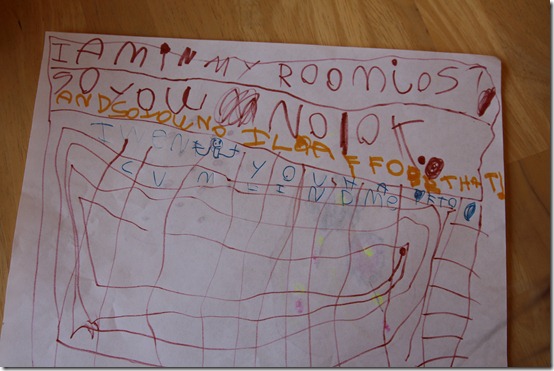 I am in my room jost so you no ok.
I am in my room jost so you no ok.
And so you no I laff obt that!
I went you haf to cum find me
Sometimes the notes build a fantastically crafted and increasing level of foreboding within my soul as I read one after the other.
Note 1:
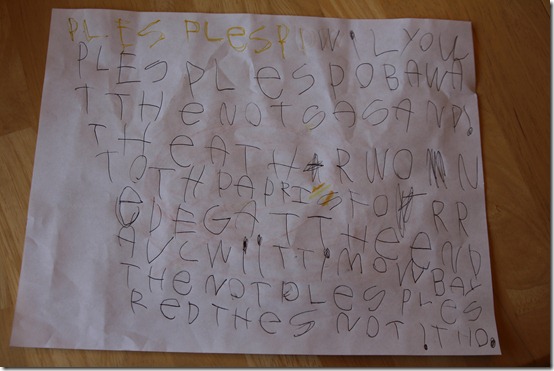 Ples ples wil you ples ples oba wat the not sas
Ples ples wil you ples ples oba wat the not sas
and the athr won to
th papr is for redeg at the end af cwiit tim
owbay the not ples ples
red thes not it ok.
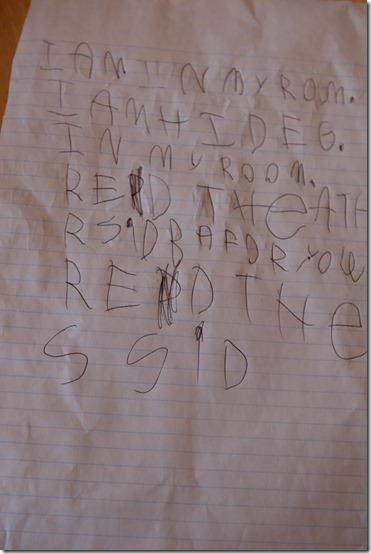 I am in my room.
I am in my room.
I am hideg.
In my room.
Red the ather sid bafor you red thes sid.
Note 2, Side B:
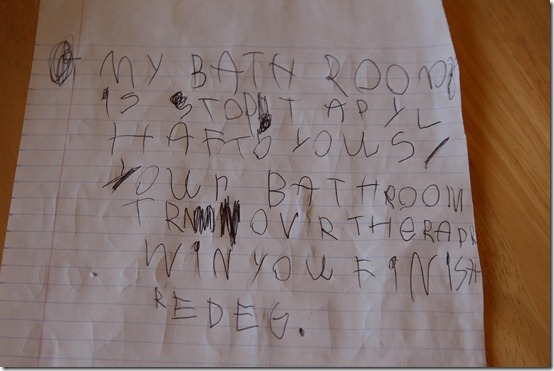 My bath room is stopt ap yo haf to yous your bathroom
My bath room is stopt ap yo haf to yous your bathroom
trn ovr the papr win you finish redeg.
The girl could write horror films, that’s all I’m saying.
At the very beginning of this new writing phase, some of the notes were a bit hard to interpret, thanks to the complete absence of spaces between words.
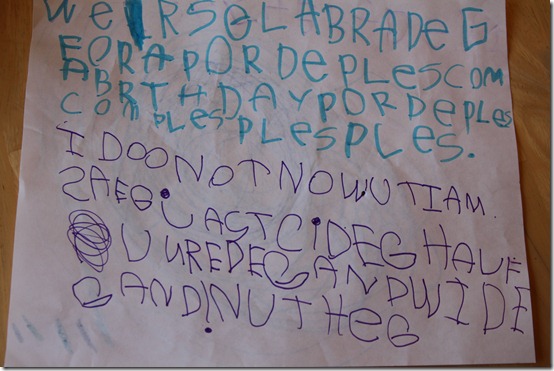 We r selebradeg for a porde
We r selebradeg for a porde
ples com
a brthday porde ples come
ples ples ples
I doo not no wut I am saeg
jast cideg hauf u redeg and wideg and nutheg
After spending a good ten minutes deciphering and understanding that note (which must have been exactly what she wanted, since it was just exciting to have me reading and writing and nothing), I mentioned to her that perhaps she could offer me the greatest kindness of the gift of word spacing.
So the next day, I got this:
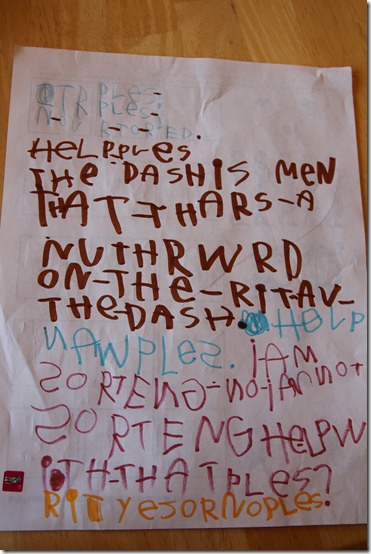 Ples ples not r u r to red
Ples ples not r u r to red
help ples
the dash is men that thars a nuthr wrd on the rit av the dash.
Help naw ples I am sorteng
No I am not sorteng help with that ples?
Rit yes or no ples.
Her notes, at times, can portray the specific desperation that being alone can birth in the soul of a five year old:
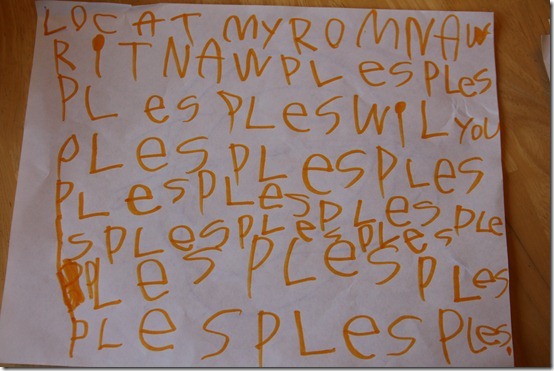
Loc at my rom naw
rit naw
ples ples wil you ples ples
ples ples ples ples ples ples ples ples ples ples ples ples ples ples
On one particular day, there were notes on several stairs. These were thrown strategically down the stairs, with a well-thought out contingency plan.
One one side,
And on the other,
 Cam upstars ples ples wil you ples ples ples?
Cam upstars ples ples wil you ples ples ples?
Later, I asked her about this note. She shrugged and said, “When you’re throwing notes down the stairs, you don’t know which side they’ll land on. That’s why I wrote instructions to you.”
(Clearly she has quite a bit of faith in my ability to interpolate the need to turn over a piece of paper.)
Her notes, at times, will be a deep confession, most likely eating away at her soul throughout her quiet time.
For instance, she has a rainbow projector in her room. It lasts for fifteen minutes, and we turn it on every night as we leave the room. When it goes off, she’s supposed to quit playing and go to bed.
One day during quiet time, she left me this confession:
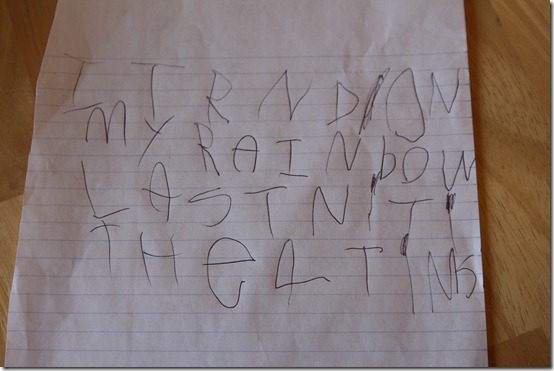 I trnd on my rainbow last nit I the 4 tims
I trnd on my rainbow last nit I the 4 tims
Another day, she confessed her quiet time activities.
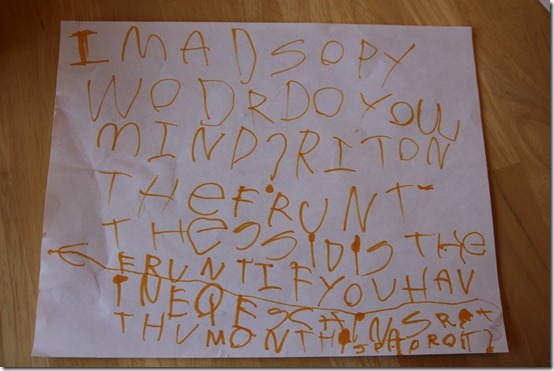 I mad sopy wodr do you mind? Rit on the frunt
I mad sopy wodr do you mind? Rit on the frunt
Thes sid is the frunt
<———————————————
If you hav ine qeschins rat thum on this papr ok?
Obviously, there’s quite the trend of bathroom concerns during quiet time (not to even mention her first quiet time ever resulting in the most traumatic bathroom issue of all time), but I finally got it through to her: You mess it up, you clean it.
After that, I received this one.
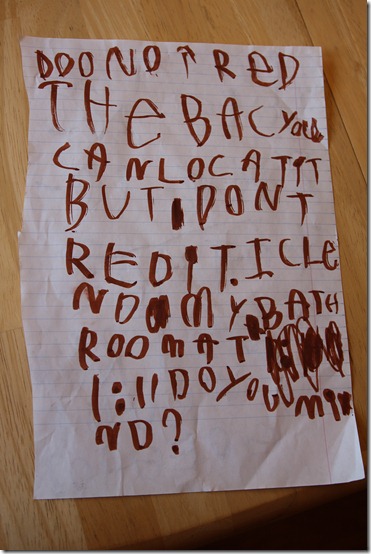 Doo not red the bac you can loc at it but don’t red it.
Doo not red the bac you can loc at it but don’t red it.
I clend my bathroom at 1:11 do you mind?
And, just in case the curiosity is overwhelming you (or the Great Fear and Foreboding of what she didn’t want me to know she cleaned up), this is The Side That Shall Not Be Read:
 Cin I tac this to the in to the restrunt wr unt goeg to?
Cin I tac this to the in to the restrunt wr unt goeg to?
Because sometimes, a note is just a note.
You might have noticed that my husband has a bit of obsession with Christmas.
…Which would explain why he was willing to dress as a donkey to get me in a Pregnant Mary outfit two years ago.
So as my husband encourages me ever quickly down the slippery slope of becoming a Holiday Liberalist, we found ourselves, yet again, in a Christmas scene for Halloween.
…except that Chris got a promotion – from sweaty donkey to ridiculous elf (in a pair of boxers that he so fortunately won four years ago.)
…and Noah got a demotion – from the unborn Son of God to Token Polar Bear in Random North Pole Scene (RNPS).
…but he did add a bit of interest to his costume, as he preferred the Abby and Brittany look.
Although Noah ran from every photo opportunity,
and only allowed me side shots of him in full costume as he desperately declothed his head,
Ali stayed true to her Princess ways and allowed a full photoshoot, requesting that I be sure and place them on my blog, not Facebook and Twitter, so that more people would be able to see them.
So here you go, blog – you’re welcome.

But while I was busy photographing the children, Chris was already at Church constructing his beloved RNPS.
Upon arrival, the kids were…well, they were more impressed than they looked.
Ali remembered the extreme businesslike attitude that it takes to hand out candy to 3,000+ kids, so she did a few stretches, planned her candy sorting strategy, and watched as the crowds drew nigh.
(While Noah tried to stash as many suckers as possible in his Polar Belly.)
The superheroes landed, and Ali set to work.
Noah watched, slurping down candy, confused as to why his sister would give it all away.
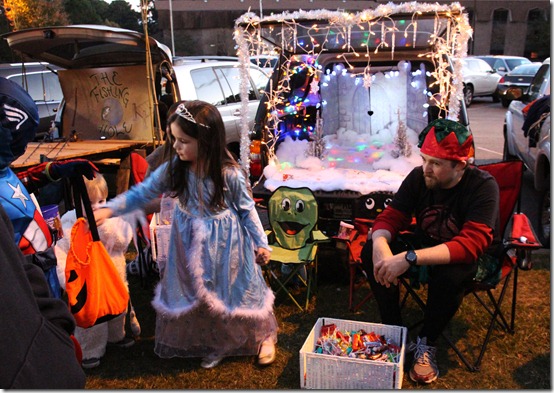
But more exciting than 100 pounds of candy was the arrival of someone very important…
Pop, back from Memphis, with his own “custom” Halloween costume, or eye at least.
Ali exhausted early and was swept away by her Fairy Godmother to go candy-collecting,
And so I re-recruited Noah – just to see if he would actually give the candy away.
Surprisingly enough, he did. But he painstakingly made every kid wait a good fifteen seconds as he contemplated letting go of the goodness,
and then was the King of Awkwardly Long Eye Contact, just daring them to not appreciate the gift of which he bestowed.
Noah and I broke away to check out the other trunks as he sucked the life off of yet another sucker stick.
My favorites included the 50’s Soda Shoppe,
The Italian Ristorante,
The iPhone that dropped candy out of the bottom upon choosing an app,
CANDY MOUNTAIN, Charlie(!!),
An extremely happy Mexican Restaurant,
And, strategically choosing the last stop of the trunks, Heaven.
It was a long night for Polar Bears everywhere.
But fortunately, there were substances available in a high enough volume to drown any amount of sorrows.
And because there just haven’t been enough already, here’s a gratuitous cute photo of my kids.
Because that’s the real meaning of Halloween.
(That, and stealing all of the good candy after they go to bed.)
I just wanted to let all of you know that were in the storm’s path that I’ve been following the landfall and aftermath with a close eye. I have been praying for you all!
We’re all too familiar with horrific storms around here, and even more familiar with power outages. I know how difficult it is to go days without power – it’s draining and depressing.
So if you were at all affected by Sandy, let me know how you’re doing! I’m not sure how many of you were in the line of the storm, but I really want to hear from those of you who were.
Also, if there are ways to help those in your areas affected by the storms, let me know that as well.
So please, check in and tell your stories! I will be praying for a speedy recovery process for everyone involved.
There are certain things that your parents drill into you enough that you grow up completely believing.
Brainwashed, some might say.
For instance, saying “Yes Ma’am” and “Yes Sir.” This was a known requirement of righteousness in my family – it wasn’t an option. Even if we WERE on the other side of the country where people thought we were oddly quaint at best or sarcastically rude at worst.
Also – Star Trek: The Next Generation. If you grew up watching it together as a family, you can’t just discard your great admiration and respect for Counselor Troi just because you find out later in life how very uncool it is to be a ST:TNG fan. You can hide your feelings and you can suppress your desires to watch, but you can’t wash yourself entirely of them.
(But I’m not hiding them anymore. I miss Q and Picard and Lwaxana. There. I said it.)
Another one was late night shows. My parents watched Leno.
I didn’t watch Leno growing up, but I knew that they did. So I learned that Leno was the funny one – not Letterman.
This belief was only solidified by the fact that Mr. Leno was the first celebrity I ever met.
During my tween and teen years, my Dad’s job was to rebuild antique race cars for epic race journeys through Mexico, from China to Paris, and to be driven at the Monterey Historic races. One of the perks of his job was to trailer said race car from Birmingham to California, family in tow.
Five days. In a truck. With my entire family. Both ways.
(The “there” was always great, but I was done with my family by the last day of the “back.”)
However, I adored Monterey.
I would have preferred to just stay in the city, but the race was what we were going for, so we attended the Monterey Historics, too. I didn’t comprehend it at the time (because I was way too bored to care), but it was a fairly high-brow event. And Jay Leno likes cars, so of course he was there.
One of these years, my Mom and I were walking around the paddocks, and there he was, chin stretching out as far as the eye can see.
We whispered to one another in giggly schoolgirl voices.
(“He’s a lot…bigger in person.”)
(“Even his chin is longer!”)
Then Mom boldly walked right up to him, stuck out her hand and said “Hi, Jay!” She shook his hand, then nonchalantly turned around and walked away.
I watched, awestruck at my Mother’s ability to be so forthcoming with a celebrity.
Jay watched, puzzled as to my mother’s odd take.
So naturally, when I became an adult shortly after I married Chris, I began watching Leno. I never even gave Letterman a single night. I didn’t question this choice. It just was.
(I guess that Chris grew up in a Leno household too, because I don’t remember us discussing this lifestyle choice.)
If we were late enough in our dawdling about bedtime, Conan O’Brien’s super late show would come on before we switched off the television set.
We’d stare in disbelief, mouths open, at how ridiculously stupid and incomprehensible his comedy routines were.
(Does he think those impressions resemble reality in any way??)
(Does he realize how completely awkward he is?!?!)
We didn’t get him. We knew that our friends did, but we didn’t.
Clearly, we were making the right comedic choices.
Then came 2009 and The Great Tonight Show Transition. Jay moved to earlier in the evening, and Conan took over Jay’s timeslot.
Chris and I pondered over what we should do about this evening altering switch. Should we DVR Jay and watch him in the normal timeslot? Or should we…heaven forbid…watch…CONAN??
We’d heard about some of the funny stunts Conan was doing to start his new reign off right, so we decided to put our faith in NBC and give him a shot.
“A week,” Chris said. “Let’s watch for the first week and see what he has in him.”
I submitted to my husband, skeptically yet dutifully.
By the end of the week, it was done. We had become a part of the Conan community, and there was no going back. It was as if the part of our brain that deciphers and processes Conanian Humor was switched on, and the awkward stupidness was suddenly mindblowingly hilarious. We found ourselves cry-giggling constantly, shushing each other so as to not wake the child.
Our Leno recordings stacked up unwatched in the echoing loneliness of our DVR box.
“Rachel? Hello… Rachel! Remember me? We made eye contact that once? I shook your Mom’s hand!! Hey! Rachel! Don’t forget about meeee!!”
Then came 2010 and TonightShowGate. Conan was gone. Jay was back. Things were ugly. Blame was flying.
We decided to give Jay the benefit of the doubt despite our suspicions and took up with him once again.
But we couldn’t laugh.
It was like watching the Awkward Drunk Uncle at a wedding, trying to be funny but being really, really dumb and more than a bit dirty-old-mannish instead.
“Has Jay changed? What happened to him??”
“I think it’s us that’s changed.”
“But he used to…he used to…he used to be so funny!”
We had a countdown until Conan was back – this time at TBS. And we rejoiced greatly.
Every now and then we turn Jay back on just to make sure we weren’t wrong. And we find ourselves puzzled all over again. We don’t really understand how such a great shift in our brain’s connectivities could have happened, but clearly it did.
Guilt?
Yes.
After all – I’ve never even met Conan!
And then there’s my parents.
I’m sure that their souls will be crushed when I finally come out with the truth: with my abandoning of the beliefs of my upbringing.
So, Mom and Dad, I’m sorry. I still believe in Ma’am and Sir and I still miss Lwaxana, but when it comes to humor, this is how it is.
(Not that they get that analogy. They aren’t Harry Potter people either. Just call me Black Sheep.)
Last week, I experienced a new echelon of sick.
The sickest sick I’ve experienced in many moons. And suns. And stars.
Three days of raging illness with every symptom in WebMD’s rather extensive checklist.
(Except for “craving to eat ice, dirt or paper” but definitely including “poor personal hygiene.”)
The kind of sick that even though I’m a stay-at-home Mom and completely responsible for two little lives, I at times could not, no matter what I tried, hold onto consciousness.
Then I’d wake up to discover that my youngest had blanketed the entire room (including all furniture) with meticulously crushed cracker crumbs, and that my eldest had scattered notes all around my resting place as if she was leaving them on my grave.
It’s actually disturbing how minimally concerned they were by the fact that they seemed to have assumed I had died. They played and chased and entertained themselves, and on the occasion that I would open my eyes, Noah would look over, smile, and say, “Hello, Mommy!!”, with mildly happy surprise over the fact that I’d figured out how to rise from the dead.
But we survived. And most thankfully, no one caught it but me, despite their attempts at convincing me otherwise.
But the fact that no one else ultimately did concede to the illnesses’ control made me suspect a possible chance of food poisoning.
(I did eat leftover shrimp the night before contracting my illness. And shrimp do seem to carry an air of suspicion that other foods do not possess.)
(Except for oysters. I would indict them of any crime over shrimp. But then again I do NOT eat oysters.)
The night after my recovery, I had a very realistic dream of it being the middle of the night (as it was), and me running into Ali’s room just in time to see her voluminously puking off the side of her bed.
…Which was followed up by me screaming at God, with much weeping and gnashing of teeth and caustic questioning of his motives in torturing me so.
(Do you think that God would get upset over someone severely questioning his judgment while dreaming? I do hope not.)
But the worst part of the entire illness was clear: My Illness Weight Loss Amounts fell significantly short of projections. And IWLA is the one silver lining that I suspect everyone, whether they admit it or not, looks forward to at the end of such a virus.
I was cheated. Totally cheated.
But at least I’m not craving dirt.